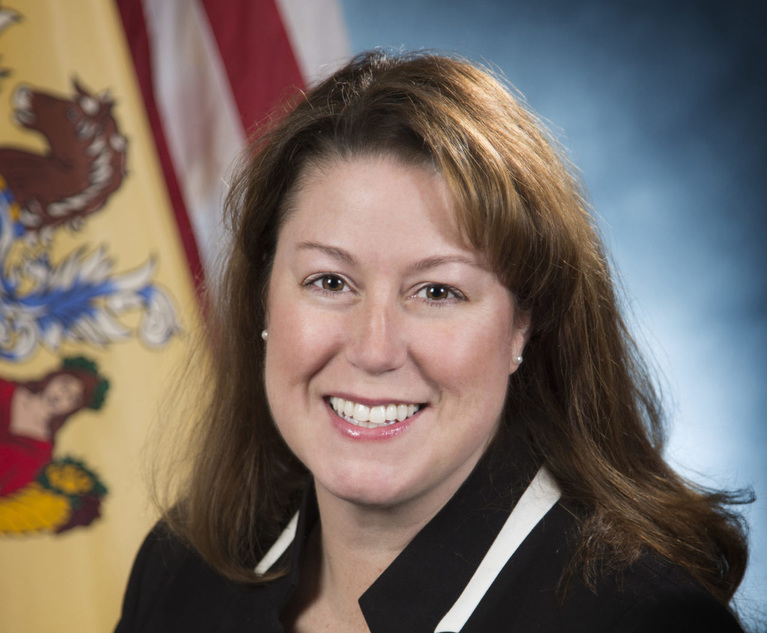Gov. Phil Murphy announced the nomination of Jennifer Davenport, currently the senior director of compliance for Public Service Enterprise Group and a former high-ranking prosecutor, to be New Jersey’s representative on the Waterfront Commission of New York Harbor.
“Jen is a universally respected and accomplished attorney who helped lead the New Jersey Attorney General’s Office for four and a half years, after long stints at the U.S. Attorney’s Office and the Drug Enforcement Administration,” Murphy said in Wednesday’s announcement.
Davenport’s nomination will be formally submitted for confirmation at the Senate’s next quorum, according to the release.
The vacancy has made news recently, as New Jersey’s open seat on the commission has prevented it from conducting business, according to reports. The seat, one of only two on the commission, has been vacant since mid-May, when construction industry magnate Joseph Sanzari resigned because of political fighting within the commission, Politico reported at the time.
“I am confident that her extensive experience in law enforcement and her steadfast commitment to public service will serve her well representing our state on the Waterfront Commission, while our administration continues the legal battle at the U.S. Supreme Court to withdraw from the entity,” Murphy said.
In March, the U.S. Supreme Court blocked New Jersey from unilaterally withdrawing from the Waterfront Commission, a bistate compact formed 69 years ago to fight crime and corruption in the region’s ports that the Garden State has been working for years to depart. In a one-paragraph order, the Supreme Court granted New York’s motion for preliminary relief to prevent New Jersey from leaving the compact.
“I am grateful to Governor Murphy for this nomination,” Davenport said in a statement. “If confirmed, I look forward to building on my experience in federal and state law enforcement to promote public safety and to serve with honor and integrity.”
Davenport, a Monmouth County resident, currently leads the development, implementation, and ongoing coordination of an enterprisewide compliance program and is responsible for the overall management of the corporate ethics and compliance function at PSEG.
Davenport has served as the first assistant attorney general and acting Union County prosecutor. Before her time with the Office of the Attorney General, she served as division counsel to the New Jersey division of the Drug Enforcement Administration and as assistant U.S. attorney at the U.S. Attorney’s Office for the District of New Jersey.
Before that Davenport was a litigation associate with Latham & Watkins and Patton Boggs. After graduating from DeSales University and Seton Hall University School of Law, Davenport clerked for U.S. Chief District Judge John Bissell of the U.S. District Court in Newark.
Waterfront Commission Litigation
In a yearslong effort to pull out of the commission, New Jersey lawmakers have argued that the bad old days of the region’s ports, in which organized crime families, corrupt union leaders and loan sharks terrorized and essentially controlled the waterfront, have long passed.
The state Legislature voted in 2018 to leave the commission and then-Gov. Chris Christie signed the legislation as one of his last acts as governor. Murphy has pledged to proceed with the effort to get New Jersey out of the commission.
“While we are disappointed by the U.S. Supreme Court’s decision to grant New York preliminary relief blocking New Jersey’s withdrawal from the Waterfront Commission, we are optimistic that when this case is fully litigated, New Jersey’s ability to withdraw from the Commission will be vindicated,” stated Murphy on March 24 following the court’s order granting New York’s motion. “I will not give up the fight to protect New Jersey’s interests, which are poorly served by a commission that operates without transparency and has long outlived its usefulness, and I thank my partners in the Legislature, labor, and industry for continuing this fight alongside us.”
New York has argued that the commission is essential for keeping the waterfront safe and that losing New Jersey as a partner in the agency would have negative effects for its counterpart on the other side of the Hudson River.
Moreover, New York maintains, New Jersey doesn’t have the legal authority to back out of the interstate compact without consent from the Empire State.
While the commission has helped to clean up once-deplorable conditions in the harbor, the New York Attorney General’s Office argues in papers filed with the Supreme Court that “criminal operations continue to seek to exert influence on both sides of the Port.”
The commission is not a prosecuting body, but does investigate criminal matters—often teaming up with other law enforcement agencies—and turns them over to district attorneys for prosecution. It also regulates who can register to work on the docks and in harbor warehouses.
In a recent example of the agency in action, the commission in January announced that it stripped a New Jersey longshoreman’s registration for fraternizing with two reputed associates of the Genovese crime family. In another, the commission announced the arrest of a Long Island-based loan shark who was charging 25% interest on his loans.
New Jersey argues that, with the commission policing the ports, the harbor is overregulated and is less hospitable for commerce than other waterfronts. That concern is echoed by the New York Shipping Association, the collective bargaining unit for stevedores and port security guards, which says that the vast majority of economic activity in the harbor is on the New Jersey side.
NOT FOR REPRINT
© 2024 ALM Global, LLC, All Rights Reserved. Request academic re-use from www.copyright.com. All other uses, submit a request to [email protected]. For more information visit Asset & Logo Licensing.


 Jennifer Davenport, senior director of Compliance for Public Service Enterprise Group. Courtesy photo
Jennifer Davenport, senior director of Compliance for Public Service Enterprise Group. Courtesy photo






